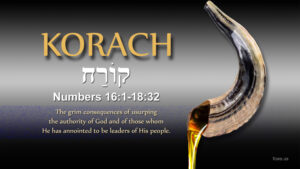 Election is an important concept revealed in the Bible. God chooses whomever He wills for the task at hand. From a human perspective, there may be others who appear better qualified and better suited for the job. Nevertheless, God’s choice is God’s choice. Often related to election is human rejection of that choice. In the section of the Bible that we are considering we see both election and the rebellion against that election portrayed.
Election is an important concept revealed in the Bible. God chooses whomever He wills for the task at hand. From a human perspective, there may be others who appear better qualified and better suited for the job. Nevertheless, God’s choice is God’s choice. Often related to election is human rejection of that choice. In the section of the Bible that we are considering we see both election and the rebellion against that election portrayed.
God originally chose Moses to lead Israel out of Egypt and to bring them to the Promised Land. Moses served as an important, prophetic picture of the coming Messiah functioning in the capacity of prophet, priest and king. Yet, Moses did not see himself as qualified for the task. He said of himself, “I have never been eloquent, neither recently nor in time past, nor since Thou hast spoken to Thy servant; for I am slow of speech and slow of tongue.” (Exodus 4:10b) The important component in election is the anointing of the Lord. The Lord makes the difference, not the human talent of the person involved. The most important human “talent” required is obedience.
Rebellion against God’s election is seen in Korah, a Levite, and Dathan and Abiram, descendants of Reuben. All three saw themselves as being cheated by God’s election. Korah functioned as a helper of the priest. Dathan and Abiram were descendents of Reuben who was the firstborn of Jacob but had been passed over for leadership in Israel. Judah had been chosen in Reuben’s place. So, all three had complaints. They justified themselves by fabricating artificial reasons for their rebellion.
An interesting side note is appropriate. When challenged, “Thus Korah assembled all the congregation against them at the doorway of the tent of meeting”. (Numbers 16:19a) The fact that he was able to do this implies that Korah and his comrades exercised considerable political strength in the congregation. I suspect that if Korah lived in modern Israel, he would be Prime Minister.
The judgment of Korah, Dathan and Abiram came swiftly. The ground opened up and swallowed them and their families. Fire came out from the Lord and consumed the 250 leaders that had allied themselves with Korah.
Again, God demonstrated His election for the priesthood. He commanded that each tribe bring a “rod” (evidently a small branch from a tree). Each was marked and placed in the tent of meeting. The rods were examined on the following day and Aaron’s rod had “sprouted and put forth buds and produced blossoms, and it bore ripe almonds.” Thus, God’s election was confirmed.
In this case, God confirmed His election promptly. This is not always the case. There were many times when my position as pastor was challenged. Even though I would have preferred that the “ground open up and those in rebellion be swallowed up”, this never happened in such a concise way. In reality though, God did repeatedly confirm his choice and His anointing. Every true “called” pastor should rest in God’s election. If he is obedient to God’s call, no individual or group in rebellion can move him. He must simply trust the Lord and remain in submission to God’s calling. The Lord will uphold him.